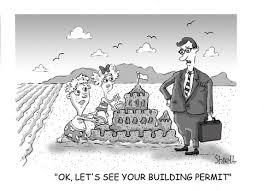Build it Right the first time.
Follow the Building Codes.
Among architecture’s many dimensions, one of the most important is safety. Architects are well versed in many fields involving both the arts and the sciences – this is the essence of the practice; one foot in the creative realm and the other in the practical realm. One of an Architect’s major practical, safety oriented responsibilities requires expertise in knowing and interpreting the Building Codes. A Building Code is a set of rules and standards developed by a recognized authority then adopted and enforced by local governments to promote and maintain a safe built environment. Building Codes provide the standards for life and health, fire safety, structural integrity, security, access and many other aspects of a building. There are Codes governing all related professionals, including engineers, safety inspectors, facility managers, regulators and construction subcontractors and all must adhere to their respective, adopted building codes.
The oldest building code known to man was traced back to the sixth Babylonian King, Hammurabi, circa 1754 BC, according to Wikipedia. The Code of Hammurabi (https://en.wikipedia.org/wiki/Code_of_Hammurabi) is well preserved on stone and clay tablets and spells out many rules including builder liability and safety. Building Codes have continued to evolve, often in response to catastrophes. Events like the Great Fire of London in 1666, the Great Chicago Fire of 1871, the 1903 Iroquois Theater Fire in Chicago, the San Francisco earthquake of 1906 and the Triangle Shirtwaist Factory fire in New York in 1911 incited the public to push for changes to improve the general safety of the built environment. Further change has been spurred on by the insurance industry, and changes in society, culture and economy.
As recently as 25 years ago, Building Codes in the US reflected local and regional influences and multiple Code authorities were in place. For better and worse, these authorities were consolidated into a single, private regulatory agency, which monopolizes the Building Code industry. Per their website (www.iccsafe.org):
The International Code Council (ICC) was established in 1994 as a non-profit organization dedicated to developing a single set of comprehensive and coordinated national model construction codes.
The International Code Council (ICC) produces a wide range of Codes, which are then adopted regionally. State and local governments maintain authority to adapt and localize the codes. The two main Codes break buildings into Commercial (The International Building Code) and Residential (International Residential Code) realms but there are many other codes. In addition to developing and maintaining the codes, the ICC provides education and certification.
Following the code adds value to your home by emphasizing efficiency and safety. Insurance premiums are lowered as fire safety and natural disaster code rules are followed. The codes are always responding to societal changes. Water conservations standards, deck safety standards and natural disaster materials are some of the causes of the alterations right now. In addition, the codes promote and guide important societal cases like Americans with Disabilities Act (ADA).
Common code violations that affect your safety and efficiency include working without a permit, improper deck installation, recognizing a load bearing wall, faulty electrical wiring, non-compliant weather enduring standards and not recognizing older materials that impact your health, such as lead and asbestos. Studies have consistently shown the benefits of up-to-date building codes and their compliance in the built environment outweigh the increase in design and construction costs.

Love it or hate it, code violations can impact your home or building. You do not need to possess an encyclopedic mind to know about the latest codes. Good design takes time. Consult a professional and renovate, repair and build it right the first time!
https://en.wikipedia.org/wiki/Building_code

OMNIA Group Architects use principles of good design, utilizing educational materials, organizations and websites as dynamic engines to perfect our programs. A great architect adds more value to your design and helps you to maximize your budget. Selecting a professional architect/designer produces and inspires the use of the architectural space. We are committed to creativity and good design.